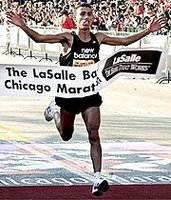Marathon's 26.2-mile run tests body and mind
That's what the marathon is all about, testing your body, your mind and your ability to focus and to see whether you can push yourself to the limit and come out a CHAMPION.
An article that I extracted out from the web which is worth reading.
By Gary Mihoces, USA TODAY
 | |||
Khalid Khannouchi crosses the
finish line in 2000 Chicago Marathon,
claiming the third of his four victories
in the Windy City race.
There are 26.2 reasons why running a marathon is hard — as in 26.2 miles from start to finish.
"There is no downtime. You are the machine," says physical therapist Jim Wharton of New York-based Wharton Performance, which trains world-class athletes and weekend warriors.
Marathoners run on hard streets. Wharton says the impact of each stride is three to four times a runner's body weight, transferred from ankles to knees to hips.
About 450,000 Americans (60% male) ran marathons in 2002. But there is no rule you have to keep running the whole way. Wharton says the accomplishment of just going the distance, no matter how, can leave people "feeling good about themselves."
When Khalid Khannouchi won the London Marathon last year, he didn't do any walking: He set a world record of 2 hours, 5 minutes and 38 seconds.
Five-hour marathoners can participate in the same event, "but in a sense you're light years away from the event he is running," Wharton says.
On his record run, Khannouchi averaged 4 minutes, 47 seconds a mile, 71.75 seconds per quarter mile. Try running such a lap around a quarter-mile track. Imagine keeping that pace for 105 laps, the marathon distance.
Elite marathoners train at high altitude, where thinner air prompts the body to produce more red blood cells to carry more oxygen to muscles. They also do speed training at lower altitudes, where they can run faster.
Wharton says it takes 5 to 10 years to develop a top marathoner. They run 100 to 150 miles a week, which makes resting periods critical.
On his trips to Kenya, Wharton has seen that nation's elite marathoners. "You don't see them going to the mall. ... They're not standing around. They're in a horizontal position at rest, or they're napping, or they're eating or they're running."
The debate about the difficulty of the marathon, much as the running, swimming and cycling components of the associated triathlon, doesn't center just on the physical aspects. "Motivation, confidence and mental toughness are necessary," says Stephen Russo, director of sports psychology at the University of Pittsburgh Medical Center Health System, co-sponsor of the Pittsburgh Marathon.
In the pack, he says, some might choose to disassociate themselves from the pain by thinking of their taxes or singing a song in their head.
But he says research shows elite runners don't disassociate: "They somehow can manage to stay focused on their running and their stride and their pace. In some ways, your elite-level runner can withstand pain better and can actually function better when they're in pain."
Yes, even the elite feel the pain. But as Russo notes, "They don't have to deal with the pain for as long because they finish faster."
Full report:
http://www.usatoday.com/sports/2003-02-20-ten-hardest-marathon_x.htm
Posted 2/20/2003 11.56pm

No comments:
Post a Comment